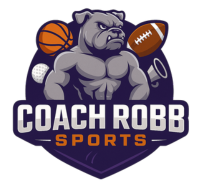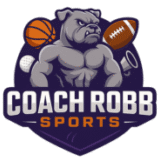Every dedicated athlete knows that success is built on discipline, practice, and perseverance. You spend hours training to build strength, speed, and skill. But what you do outside of your training sessions is just as critical to your success. Proper nutrition is the fuel that powers your performance, supports your recovery, and ultimately unlocks your true athletic potential. It is the silent partner to your physical efforts.
At Coach Robb Sports, our mission is to develop well-rounded athletes who excel in every aspect of their lives. A core part of this development is understanding how to properly fuel your body. This guide provides a clear overview of how nutrition impacts athletic performance and offers practical, supportive advice to help you optimize your diet and achieve your goals.
Why Nutrition is a Game-Changer for Athletes
Think of your body as a high-performance engine. Just as a race car needs premium fuel to perform at its peak, an athlete’s body requires high-quality nutrients to function optimally. Proper nutrition directly influences your energy levels, strength, endurance, and ability to recover. Without the right fuel, you risk fatigue, poor performance, and an increased likelihood of injury.
A well-structured nutritional strategy provides several key benefits:
- Sustained Energy: Provides the necessary calories and carbohydrates to fuel your muscles through demanding workouts and competitions.
- Enhanced Recovery and Repair: Supplies the protein and micronutrients needed to repair muscle tissue that is broken down during exercise, making you stronger over time.
- Improved Focus and Cognitive Function: A well-nourished brain is better able to maintain concentration, make split-second decisions, and stay mentally tough under pressure.
- Injury Prevention: Proper nutrition strengthens bones, supports joint health, and bolsters the immune system, making your body more resilient to the stresses of training.
Neglecting nutrition can lead to a state of under-fueling, where your body does not have the resources to adapt and grow. This can result in chronic fatigue, muscle loss, and a performance plateau that no amount of training can overcome.
The Pillars of Athletic Nutrition
Building a high-performance diet does not have to be complicated. By focusing on a few key principles, you can create a nutritional plan that supports your athletic ambitions. These pillars are macronutrients, micronutrients, hydration, and meal timing.
- Mastering Your Macronutrients
Macronutrients are the nutrients your body needs in large amounts: carbohydrates, proteins, and fats. Each plays a distinct and vital role in athletic performance.
- Carbohydrates: Your Primary Fuel Source
Carbohydrates are the most important source of energy for an athlete. When you consume carbs, your body breaks them down into glucose, which is either used for immediate energy or stored in your muscles and liver as glycogen. During exercise, your body draws on these glycogen stores to power your activity.
- Focus on: Complex carbohydrates like oatmeal, brown rice, quinoa, sweet potatoes, and whole-wheat bread. These provide a slow, sustained release of energy. Simple carbohydrates like fruits and sports drinks are best used around workouts for quick energy.
- Focus on: Complex carbohydrates like oatmeal, brown rice, quinoa, sweet potatoes, and whole-wheat bread. These provide a slow, sustained release of energy. Simple carbohydrates like fruits and sports drinks are best used around workouts for quick energy.
- Protein: The Building Block for Muscle
Protein is essential for repairing the microscopic muscle tears that occur during training. This repair process is what allows your muscles to grow bigger and stronger. Adequate protein intake is crucial for recovery, muscle synthesis, and preventing muscle breakdown.
- Focus on: Lean protein sources such as chicken breast, fish, turkey, lean beef, eggs, Greek yogurt, and legumes. For a convenient post-workout option, a high quality whey or plant based protein shake is an excellent choice.
- Focus on: Lean protein sources such as chicken breast, fish, turkey, lean beef, eggs, Greek yogurt, and legumes. For a convenient post-workout option, a high quality whey or plant based protein shake is an excellent choice.
- Fats: The Source of Long-Term Energy
Healthy fats are a vital part of an athlete’s diet. They serve as a secondary energy source for lower-intensity, long-duration exercise, support hormone production, and help absorb fat-soluble vitamins (A, D, E, and K).
- Focus on: Unsaturated fats found in avocados, nuts, seeds, olive oil, and fatty fish like salmon. Limit intake of saturated and trans fats found in processed and fried foods.
- Focus on: Unsaturated fats found in avocados, nuts, seeds, olive oil, and fatty fish like salmon. Limit intake of saturated and trans fats found in processed and fried foods.
- Carbohydrates: Your Primary Fuel Source
- The Importance of Micronutrients
Vitamins and minerals, or micronutrients, are involved in thousands of bodily processes, including energy production, bone health, and immune function. Athletes have higher needs for certain micronutrients due to the increased stress placed on their bodies.
- Iron: Essential for carrying oxygen to your muscles. Low iron can lead to fatigue and decreased endurance. Found in red meat, poultry, fish, beans, and fortified cereals.
- Calcium and Vitamin D: Critical for strong bones and muscle function. Dairy
products, leafy greens, and fortified foods are great sources. - Antioxidants (Vitamins C and E): Help combat oxidative stress caused by intense exercise. Found in fruits, vegetables, and nuts.
- Iron: Essential for carrying oxygen to your muscles. Low iron can lead to fatigue and decreased endurance. Found in red meat, poultry, fish, beans, and fortified cereals.
- Hydration: The Often-Overlooked Nutrient
Proper hydration is one of the simplest yet most effective ways to boost performance. Even mild dehydration can significantly impair your endurance, strength, and cognitive function. Water is essential for regulating body temperature, transporting nutrients, and lubricating joints.
Practical Hydration Tips:- Drink Consistently: Don’t wait until you feel thirsty. Sip water throughout the day to maintain adequate hydration levels.
- Monitor Your Urine: A pale yellow color, similar to lemonade, is a good indicator that you are well-hydrated.
- Hydrate Before, During, and After Exercise: Start your workout hydrated. During long or intense sessions, drink fluids regularly. Afterward, replenish the fluids you lost through sweat.
- Consider Electrolytes: For workouts lasting longer than 60-90 minutes, a sports drink containing electrolytes (like sodium and potassium) can help replace what is lost through sweat.
- Strategic Meal Timing
When you eat is almost as important as what you eat. Timing your meals and snacks strategically can optimize your energy levels and enhance recovery.
- Pre-Workout (1-3 hours before): Focus on a meal or snack rich in complex carbohydrates with a moderate amount of protein. This will top off your glycogen stores and provide sustained energy. Avoid high-fat or high-fiber foods, which can cause digestive issues.
- Example: Oatmeal with berries, a turkey sandwich on whole-wheat bread, Greek yogurt with a banana.
- Post-Workout (within 30-60 minutes after): This is a critical window for recovery. Consuming a combination of carbohydrates and protein helps replenish glycogen stores and initiate muscle repair.
- Example: A protein shake with fruit, chocolate milk, or grilled chicken with a sweet potato.
- Pre-Workout (1-3 hours before): Focus on a meal or snack rich in complex carbohydrates with a moderate amount of protein. This will top off your glycogen stores and provide sustained energy. Avoid high-fat or high-fiber foods, which can cause digestive issues.
Your Fuel for a Lifetime of Success
Nutrition is not about restrictive dieting; it is about empowering your body to perform at its best. By fueling yourself with intention, you provide the foundation for improved performance, faster recovery, and a long, healthy athletic career. The discipline you apply to your training should extend to your plate.
At Coach Robb Sports, we are committed to guiding you on your journey to excellence. Adopting these nutritional principles will not only make you a better athlete but will also instill healthy habits that last a lifetime. Start fueling for victory today, and experience the powerful difference it makes.










